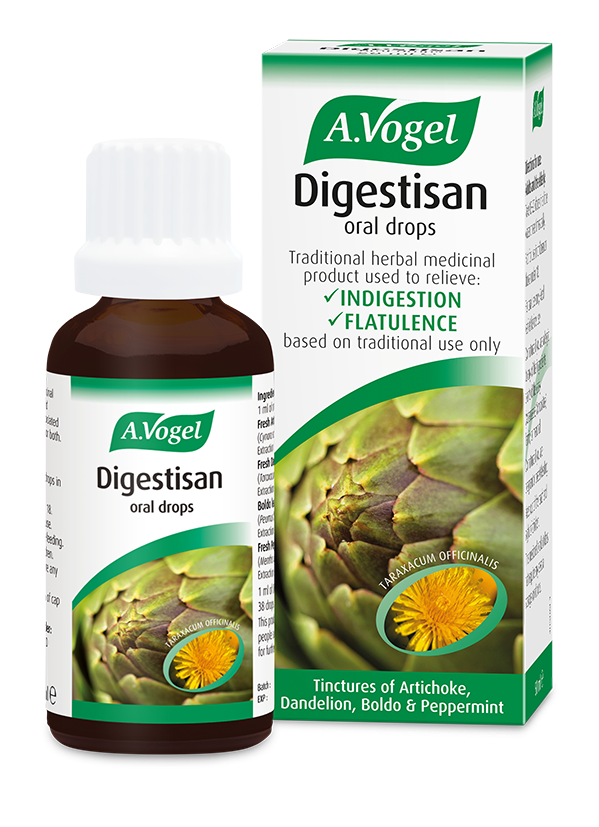An introduction to what causes bloating
The word ‘bloating’ usually refers to the presence of excessive gas in the digestive tract. It is normal for the digestive system to produce gas, and although there is no clearly defined line between what is normal and abnormal, some people find that the amount of gas their bodies produce makes their abdomen distend or swell.
The digestive system is not the only cause of abdominal distension – for a brief summary of the other causes, go to our page on bloated stomach.
Indigestion
Indigestion is a common cause of digestive bloating. It is a poorly defined condition, but what is clear is that indigestion arises because of a disturbance in the normal functioning of the oesophagus (gullet) and the stomach.
The stomach produces a number of enzymes which help us digest the food we eat. It also produces an acid (hydrochloric acid) which is needed to help the digestive enzymes work better.
Indigestion occurs when the normal process of digestion is disturbed. It causes discomfort in the abdominal (stomach) area which starts when we eat – either soon after or within 30 to 60 minutes. Symptoms are described as mild tenderness just under the ribs in the middle of the tummy with feelings of bloating after eating and the desire to burp.
The main causes of indigestion include overeating, eating too quickly, excessive alcohol, smoking and fatty foods. If symptoms are severe, Helicobacter pylori or a hiatus hernia should be considered as causes.
Acid reflux
Like indigestion, acid reflux is a problem caused by disturbances in the upper part of the digestive system.
Acid produced in the stomach is prevented from moving into the gullet because of a ‘valve’ lying between the two organs. However, there are times when this mechanism fails and the acidic fluid in the stomach flows backwards and upwards into the gullet. This is known as acid reflux.
Symptoms of acid reflux are very similar to those of indigestion and sometimes, it is difficult to distinguish one from the other. However, acid reflux tends to cause pain just behind the breastbone. If reflux is severe, one can also taste the acid at the back of the throat.
Acid reflux may also give rise to the desire to burp and in doing so, one relieves the sensation of bloating. What causes this is not known.
Food intolerances
Food intolerance appears to have become an increasingly common problem. In general, the condition involves the middle part of the digestive system, principally, the small intestines.
Apart from wheat intolerance, perhaps the most well-known food intolerance is to lactose. In this condition, the digestive system has low levels of an enzyme called lactase which is responsible for breaking down milk-sugar (or lactose).
The result of this is that bacteria in the gut works on lactose instead, and this produces an excess of wind and consequently, bloating. In some cases, stools become looser and this in turn leads to the digestive system functioning poorly.
The mechanism leading to intolerance to other food substances has not been as clearly described. However, what can be assumed is that similar factors will be involved.
Irritable bowel syndrome
Irritable bowel syndrome (IBS) is another well-known cause of bloating in the digestive system. It mainly affects the lower part of the digestive tract (colon), but can also involve the gut higher up.
IBS is a multi-factorial condition and what seems to be clear is that food intolerances may also be involved as a cause. This could be the reason that bloating is a symptom associated with IBS.
Constipation
This is a condition of the lower part of the bowel. There is no clear definition for constipation:
- Some believe that you should move your bowels at least once a day and anything less is not normal
- Others feel that it is the consistency of your bowel movement that is important. Soft formed stools are normal, whereas diarrhoea or hard pallet-like stools (similar to rabbit or sheep droppings) are not.
What is clear, however, is that constipation can cause an excess of gas in the colon and bloating. This arises because bacteria have had a longer time to ‘work’ on the contents of the bowel, producing more gas.
Bacterial overgrowth / imbalance in the gut
In health, our gut is filled with trillions of bacteria and these play a very important part in the normal functioning of the digestive system.
Sometimes, the numbers and types of bacteria in our gut alters. This could be the result of changes in our diet, the use of antibiotics, general lifestyle alterations or even stress.
What has become clear recently is that bacteria affect the way our gut functions in profound ways. Having the wrong types of bacteria, known as bacterial overgrowth or more accurately, an imbalance in the bacterial gut flora, can lead to malabsorption of nutrients.
These imbalances also cause an abnormal amount of gas to be produced within the gut, and bloating.
Menopause
If you are going through the menopause you may experience some abdominal bloating. While this may be unexpected, it is a relatively common symptom of the menopause caused by hormonal fluctuations. If you think that your bloating may be a symptom of the menopause, then our bloating and menopause page will provide you with more information and remedies for this.








